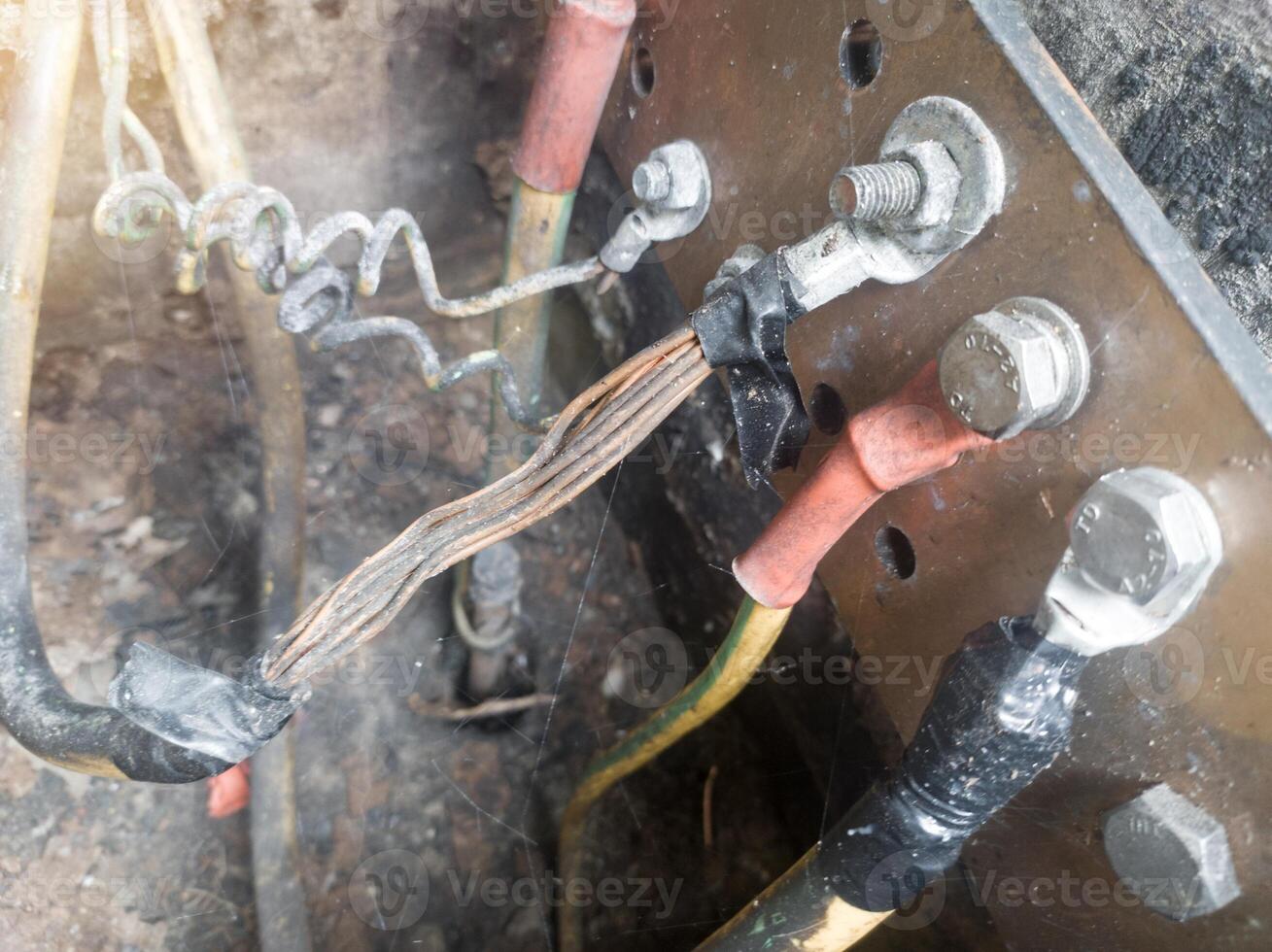Breathtaking Tips About What Causes A Bad Ground

What Causes a Bad Ground? Unearthing the Electrical Gremlins
1. Corrosion's Creeping Curse
Okay, let's talk about "bad ground." It sounds kinda spooky, right? Like something out of a sci-fi flick. But in reality, it's just an electrical connection that's gone rogue. Think of it as a tiny electrical rebellion brewing in your wiring. A "bad ground" essentially means the intended grounding path in an electrical circuit isn't doing its job properly. So, what kicks off this whole rebellion?
One of the biggest culprits is corrosion. Rust, oxidation, and other forms of corrosion can build up on the grounding connection points. Imagine your ground wire trying to make a solid connection, but it's like trying to shake hands with someone wearing super-thick gloves. The connection is weak, resistance goes up, and things start to go haywire. Moisture, salt, and exposure to the elements all accelerate this corrosion process. Think of it like leaving your bike out in the rain for too long — things start to get rusty!
The result? Your electrical system becomes unreliable, leading to voltage drops, erratic behavior of electrical devices, and, in some cases, even dangerous situations. Think flickering lights, appliances that don't work correctly, or worse, the potential for electrical shock. It's like a domino effect where one small problem causes a cascade of bigger issues.
So, regular inspection and cleaning of grounding points, especially in damp or corrosive environments, are crucial. A little preventative maintenance can save you a lot of headaches (and potential safety hazards) down the road. Think of it as giving your electrical system a regular check-up to keep everything running smoothly.
2. Loose Connections
3. The Peril of the Wiggle
Another major cause of a "bad ground" is simply a loose connection. Over time, vibration, temperature changes, or just plain old wear and tear can cause connections to loosen. It's like a wobbly tooth — it's there, but it's not really doing its job properly.
When a grounding connection is loose, the resistance in the circuit increases. This increased resistance restricts the flow of current, causing voltage drops and potentially leading to erratic electrical behavior. Imagine trying to run a marathon with your shoelaces untied — you're not going to perform at your best, and you might even trip and fall. Similarly, a loose grounding connection can cause your electrical system to stumble and falter.
Furthermore, a loose connection can create a phenomenon called "arcing." Arcing occurs when electricity jumps across a small gap, creating heat and potentially causing a fire. It's like a tiny lightning storm happening inside your electrical system. Not good!
Thats why regularly checking and tightening grounding connections is so important. A little bit of preventative maintenance can save you from potential fire hazards and keep your electrical system running smoothly. Think of it as tightening the bolts on a bridge — it ensures the stability and safety of the entire structure.
4. Damaged Wiring
5. Insulation's Integrity
Physical damage to grounding wires is another common culprit. Think of wires that have been chewed on by rodents, crushed during construction, or simply worn out over time. The insulation protecting the wire can crack, exposing the bare metal to the elements and increasing the risk of corrosion. Its like a hole in your roof — it can lead to all sorts of problems down the line.
When a grounding wire is damaged, it can compromise the entire grounding system. The wire might break completely, leaving the circuit ungrounded. Or, it might develop high resistance due to corrosion or partial breaks, which can impede the flow of current and create a "bad ground" situation. Think of it like a kink in a garden hose — it restricts the water flow and reduces the pressure.
Damaged wiring can lead to a variety of electrical problems, including flickering lights, malfunctioning appliances, and increased risk of electrical shock. In severe cases, it can even cause electrical fires. It's like playing with fire — it's only a matter of time before someone gets burned.
Therefore, it's essential to inspect wiring regularly for any signs of damage, especially in areas prone to physical stress or rodent activity. If you find damaged wiring, it's crucial to replace it immediately to prevent further problems. Think of it as patching a hole in your roof before the entire ceiling collapses.
6. Improper Installation
7. Cutting Corners Can Hurt
Sometimes, the problem isn't wear and tear but rather improper installation in the first place. If grounding wires are not properly connected, terminated, or sized correctly, it can lead to a "bad ground" right from the start. Its like building a house on a weak foundation — its bound to crumble eventually.
For example, using undersized grounding wires can create excessive resistance, limiting the ability of the grounding system to protect against electrical faults. Similarly, if grounding connections are not properly tightened or if the wrong type of connectors are used, it can result in a weak or unreliable connection. It's like using the wrong type of glue to assemble a model airplane — it might hold for a little while, but it's not going to last.
Improper installation can be difficult to detect because the problem might not be immediately apparent. However, over time, the effects of a "bad ground" will start to manifest in the form of flickering lights, malfunctioning appliances, and increased risk of electrical shock. Its like a ticking time bomb — its just a matter of time before it goes off.
That's why it's crucial to hire a qualified electrician for any electrical work, especially when it comes to grounding. A qualified electrician will ensure that all grounding connections are properly made, that the correct size wires are used, and that the installation meets all applicable electrical codes. Think of it as hiring a professional architect to design your house — it ensures that the structure is sound and safe.
8. Environmental Factors
9. Earth's Elements
Environmental factors can also play a significant role in causing a "bad ground." Exposure to moisture, chemicals, and extreme temperatures can all accelerate the corrosion of grounding connections and the degradation of grounding wires. Its like leaving your car out in the sun and rain — its going to take a toll on the paint and the interior.
For example, in coastal areas, the salt air can corrode grounding connections very quickly. In industrial environments, exposure to chemicals can also cause corrosion and damage to grounding wires. And in areas with extreme temperature fluctuations, the expansion and contraction of materials can loosen grounding connections over time. Its like a never-ending cycle of stress and strain on your electrical system.
To mitigate the effects of environmental factors, it's important to use corrosion-resistant materials for grounding connections and to protect grounding wires from exposure to moisture and chemicals. It's also important to regularly inspect grounding connections for signs of corrosion and to clean or replace them as needed. Think of it as giving your electrical system a regular spa treatment to keep it looking and feeling its best.
Regular inspections and preventative maintenance are your best defense against environmental factors. It's all about staying ahead of the game and protecting your electrical system from the elements.

Burnt Ground Cable, Failure In The Industrial Electrical Installation
FAQ About Bad Grounds
10. What are the symptoms of a bad ground?
Some common symptoms include flickering lights, appliances that don't work correctly, static on electronic devices, and even mild electrical shocks when touching metal objects. It's like your electrical system is trying to send you an SOS signal.
11. Can a bad ground cause a fire?
Yes, absolutely! A bad ground can lead to arcing, which generates heat and can ignite nearby flammable materials. It's crucial to address grounding issues promptly to prevent potential fire hazards. Think of it as putting out a small campfire before it spreads into a raging wildfire.
12. How can I test for a bad ground?
Testing for a bad ground usually requires a multimeter or a circuit tester. You can check the voltage between the grounding wire and a known good ground point. However, if you're not comfortable working with electricity, it's best to call a qualified electrician. Safety first!

Can A Bad Ground Cause An Alternator To Overcharge? Vehicle Fixing


